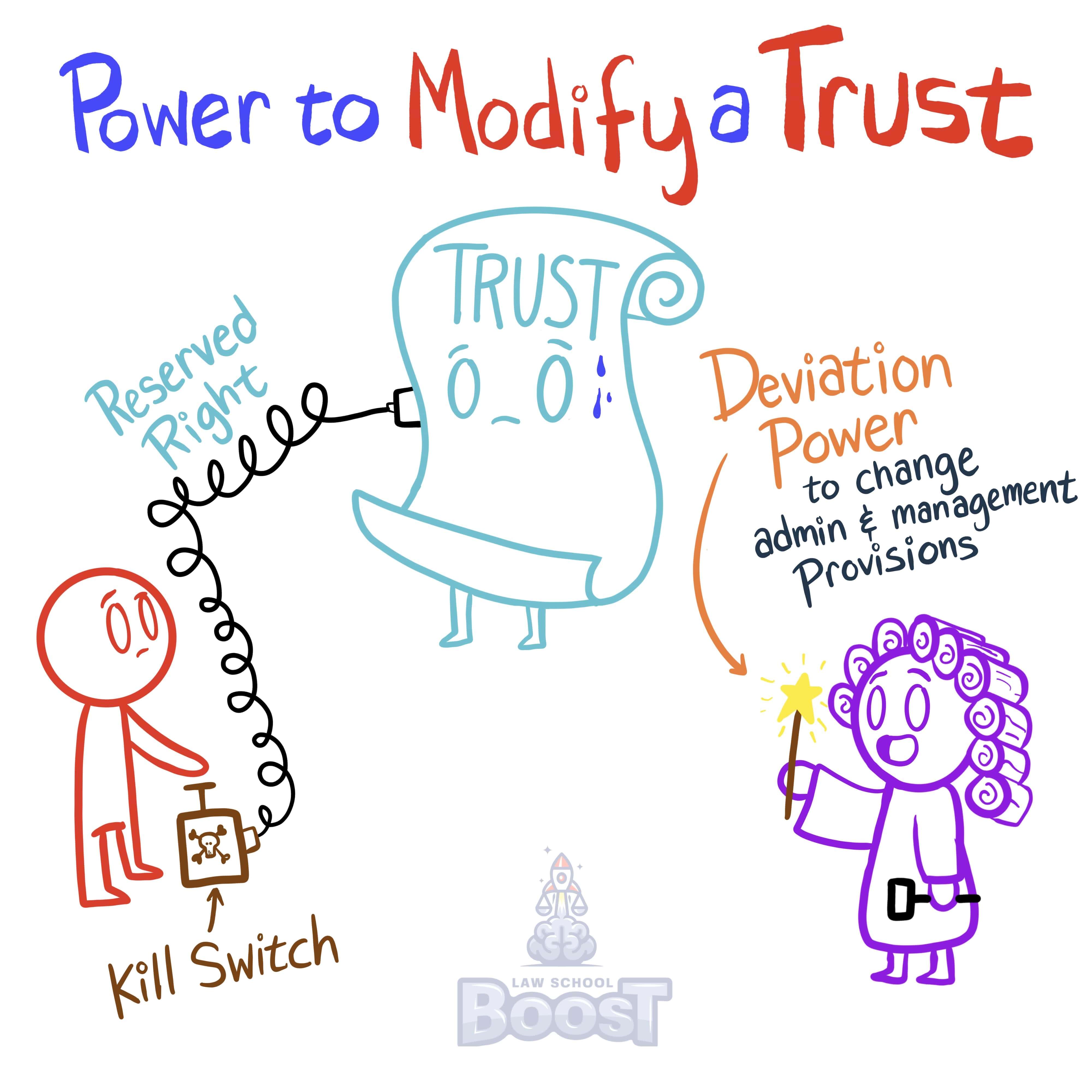🥺
Trusts • Modification and Termination of Trusts
TRUSTS#028
Legal Definition
A settlor can modify a trust where they expressly reserve the right. Additionally, if they have the power to revoke, they also have the power to modify.
A court can modify charitable trusts or private trusts through its deviation power, meaning the court may change administration or management provisions—but not beneficiaries—due to changed circumstances and necessity.
A court can modify charitable trusts or private trusts through its deviation power, meaning the court may change administration or management provisions—but not beneficiaries—due to changed circumstances and necessity.
Plain English Explanation
There are generally two ways that a trust can be modified after its creation. The first way is by the creator of the trust if they gave themselves the right to modify the trust. You may be thinking, "Well, why wouldn't the creator of a trust always reserve the right to make modifications later?" As you will learn in other cards, when the creator of a trust keeps a string attached to the trust, it acts like a backdoor for others to access the trust (such as creditors). So while doing so allows the benefit of changing your mind, it does so by exposing the trust to being attacked.
The second way is via the court under its deviation power, meaning its power to allow a trust to deviate from its original terms. This usually happens when circumstances have changed that, if left uncorrected, would negatively impact the purpose of the trust. Thus, the courts step in and modify some aspect of the trust's terms so that the trust can better achieve its purpose.
The second way is via the court under its deviation power, meaning its power to allow a trust to deviate from its original terms. This usually happens when circumstances have changed that, if left uncorrected, would negatively impact the purpose of the trust. Thus, the courts step in and modify some aspect of the trust's terms so that the trust can better achieve its purpose.
Hypothetical
Hypo 1: Bob creates a trust to fund his son Timmy's education. Initially, the trust says the money can only be used for college. However, Bob later decides that trade school should also be an option. He had previously stated in the trust that he reserves the right to make changes. Result: Since Bob explicitly reserved the right to modify the trust, he can legally change the terms to include trade school as an option for Sam.
Hypo 2: Sam sets up a trust to support a local animal shelter. Over the years, the shelter's needs change significantly due to new animal welfare laws. The court steps in and modifies the trust to align with the new laws, ensuring the shelter still benefits. Result: The court uses its deviation power to adjust the trust's administration, addressing the changed circumstances without altering the beneficiary, the animal shelter.
Hypo 3: Bob establishes a trust for Sam's medical research. Initially, the trust specifies funding for cancer research. As medical priorities shift, Sam requests that the trust be modified to include heart disease research. However, Bob did not reserve the right to modify the trust. Result: Since Bob did not reserve the modification rights and cannot revoke the trust, he cannot legally modify it to include heart disease research.
Hypo 4: Sam inherits a charitable trust from Bob that supports art education. Due to economic changes, managing the trust becomes too costly. The court decides to modify the trust to reduce administrative expenses. Result: The court exercises its deviation power to change the trust's management aspects due to economic necessity, ensuring the trust's sustainability without changing its purpose.
Hypo 5: Bob creates a trust for Sam's children's education. Later, Bob wants to change the beneficiaries to his own children. Bob did not reserve the right to modify the trust. Result: This change is not possible under the rule, as modifying beneficiaries goes beyond the scope of what the settlor or court can alter.
Hypo 2: Sam sets up a trust to support a local animal shelter. Over the years, the shelter's needs change significantly due to new animal welfare laws. The court steps in and modifies the trust to align with the new laws, ensuring the shelter still benefits. Result: The court uses its deviation power to adjust the trust's administration, addressing the changed circumstances without altering the beneficiary, the animal shelter.
Hypo 3: Bob establishes a trust for Sam's medical research. Initially, the trust specifies funding for cancer research. As medical priorities shift, Sam requests that the trust be modified to include heart disease research. However, Bob did not reserve the right to modify the trust. Result: Since Bob did not reserve the modification rights and cannot revoke the trust, he cannot legally modify it to include heart disease research.
Hypo 4: Sam inherits a charitable trust from Bob that supports art education. Due to economic changes, managing the trust becomes too costly. The court decides to modify the trust to reduce administrative expenses. Result: The court exercises its deviation power to change the trust's management aspects due to economic necessity, ensuring the trust's sustainability without changing its purpose.
Hypo 5: Bob creates a trust for Sam's children's education. Later, Bob wants to change the beneficiaries to his own children. Bob did not reserve the right to modify the trust. Result: This change is not possible under the rule, as modifying beneficiaries goes beyond the scope of what the settlor or court can alter.
Visual Aids



